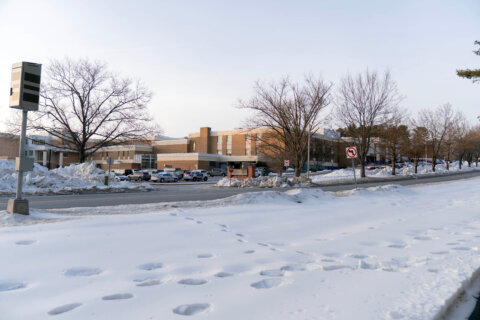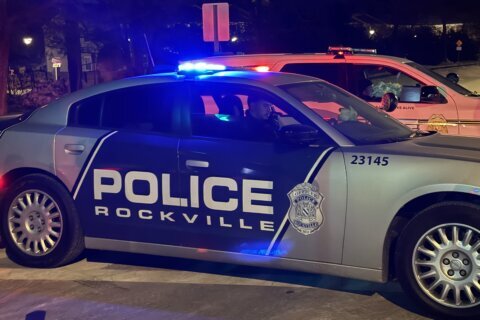Bomb threats, carjackings, gun offenses. While juvenile crime on the whole in Maryland is below pre-pandemic levels, the numbers for particular offenses are “off the charts,” according to Montgomery County State’s Attorney John McCarthy.
Montgomery County Council members on the Public Safety Committee were briefed on the issue Monday. According to information provided to them, juvenile carjackings in the state jumped by 85% and handgun violations were up 220% between 2021 and 2023.
Last week, a high school student was found with a firearm at Walter Johnson High School in Bethesda. On the same day, students at Fairland Elementary School found a gun in a trash can on campus.
Also last week, a 12-year-old was found responsible for seven bomb threats directed at Montgomery County schools. A 15-year-old was found responsible for a bomb threat directed at Paint Branch High School on Thursday.
“Thousands of people were impacted by the conduct of two people,” Council member Dawn Luedtke said during the Monday committee meeting.
Luedtke added there doesn’t appear to be an adequate program to address the kind of offenses committed.
Police said the 15-year-old was charged with making threats of mass violence, while the 12-year-old could not be prosecuted under Maryland state law due to their age.
Luedtke said measures are needed “to help that child understand what they did, and to help their parents understand what they did.” She added that she doesn’t see that happening.
“The juvenile justice system is broken. It is broken because there are not programs for kids,” State’s Attorney McCarthy said.
What’s needed, he emphasized, are “resources, resources, resources, programs, programs, programs.”
McCarthy said, currently, his office may see three out of 10 juveniles who have committed an offense because most are not referred to the courts.
“This is a crisis, and I don’t think people are understanding that,” Council member Natali Fani-González said. “I talk to [Montgomery County] police on a daily basis … they’re on my speed dial right now about this issue.”
She said residents in her district, which includes the Wheaton-Glenmont area, have been especially affected by juvenile crime.
Both council members and police agreed that simply locking kids up is not the solution.
“We have been accused of simply wanting to just arrest juveniles as a way of solving the problems of our society,” Montgomery County Police Chief Marcus Jones said. “We know that doesn’t work, it’s never worked.”
Council member Kristin Mink said the county should be directing juveniles into programs referred to as “community conferencing,” similar to the kind of restorative justice programs used in schools to redirect students who may have been involved in disputes or violations of codes of conduct.
While restorative justice programs are used in schools, Luedtke said they require that the victim be amenable, too.
“Not all victims are going to be OK with saying ‘I’m going to sit here and have a restorative circle with the person who harmed me,'” Luedtke said.
Council member Fani-González said now is not the time to be “romanticizing the issue and ‘kumbaya’ and all that good stuff. This is about taking action and getting help to the kids and to the families to move us forward.”
Research backs the use of programs like community conferences, according to Mink, who said she’s recently learned about programs in use in Anne Arundel, Baltimore and Prince George’s counties.
“The federal and state government take as a given, the further kids go in the juvenile justice system, the worse the outcomes are statistically, in terms of likelihood of reoffending and recidivism,” she said.
Lisa Garry, the deputy secretary from the Maryland Department of Juvenile Services, told Fani-González that her agency is working on a three-pronged approach to deal with juvenile crime, prevention, intervention, and what she called “community transformation.”
That third element, Garry said, would focus on making more investments in “local resources and no longer doing these large, centralized state contracts that do not serve the local communities in a way that get you the results that you want.”
Fani-González said she loved the idea.
Taking a cue from other Md. jurisdictions
Montgomery County should take a cue from some of its neighbors regarding juvenile crime, Council member Mink said. She wants the county to adopt a “community conferencing” strategy that’s in place in at least seven other Maryland jurisdictions, including neighboring Prince George’s County.
“The beautiful thing … is that if the offender does not agree to participate, and if they do not follow through on the agreement [reached with the victim], then the referral simply goes right back to the referring party, whether that is the police, the state’s attorney, the school, what-have-you, and they can proceed with it in the normal fashion,” she said.
Mink’s suggestion was met with some interest from attendees during the committee meeting, including Carlotta Woodward, the chief of the Juvenile Court Division of the Montgomery County State’s Attorney’s Office.
However, Woodward said there’s a potential hitch in the system.
“We have timing issues,” Woodward said. “If our office receives a particular case, we have to petition it within 30 days. If we do not do that, we are forever barred from petitioning that particular case in court.”
A petition in juvenile court is the equivalent of a criminal complaint or indictment in adult court.
Mink said a victim need not appear in the community conferencing program, although she said that’s how it “works best.” But, she added, “a group from the community” can serve as a proxy for the victim “and engage in the conversation with the person who committed the harm.”
The Harford County government website states community conferencing has seen a more than 95% compliance rate with the agreements reached. In that county, community conferencing is offered as an option in cases ranging from second-degree assault to trespassing.
Three county council committees, including the Public Safety, Health and Human Services committees and the Education and Culture Committee are expected to hold a joint work session on juvenile crime — and the restorative justice model — at a date in the future. A date has not yet been selected.








